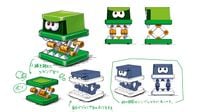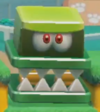Template:Species-infobox

Concept art of a Hop-Chops
Hop-Chops are uncommon enemies that appear in Super Mario 3D World and Super Mario Maker 2. They are sentient green springboards with a square head, red eyes, and sharp teeth. These enemies usually appear in groups of three or more, and reside in areas where a springboard is required to obtain a collectible, such as a Green Star.
History
Super Mario 3D World
Hops-Chops debut in Super Mario 3D World, and are usually found in groups. When players approach a Hop-Chops, it will begin to bounce toward them. Hop-Chops can be defeated by any attack. Defeating a Hop-Chops sometimes turns it into a Springboard which the player can carry and use. Usually, one Hop-Chops per group can turn into a springboard. If left as a springboard for too long, it will turn back into a Hop-Chops. This can also happen while it is carried.
Hop-Chops appear in Big Bounce Byway, Searchlight Sneak, and Mystery House Marathon.
Super Mario Maker 2
Hop-Chops reappear as enemies that can be placed in Super Mario Maker 2 stages, exclusively in the Super Mario 3D World style. In this game, they no longer are defeated when jumped on, instead acting like Trampolines initially. When given wings, Hop-Chops jump and then hover above the ground before dropping back down.
Names in other languages
| Language
|
Name
|
Meaning
|
| Japanese |
ホッパー
Hoppā
|
Hopper
|
| Chinese |
跳跳机
Tiào Tiào Jī
|
Hopping Machine
|
| Dutch |
Hop-Chops
|
-
|
| German |
Schnappolin
|
From "schnappen" (snap) and "Trampolin" (trampoline)
|
| Italian |
Bion-Bion
|
|
| Korean |
뛰용뛰용
Ttuiyongttuiyong
|
From 띠용띠용 (onomatopoeia for bouncing)
|
| Russian |
Прыг-ням
Pryg-nyam
|
From прыг-скок pryg-skok (onomatopoeia for hopping) and ням nyam (yum).
|
| Spanish (NOA) |
Ñampolín
|
From "ñam" (yum) and "trampolín" (trampoline)
|
| Super Mario 3D World / Super Mario 3D World + Bowser's Fury / Bowser's Fury
|
| Playable characters
|
Mario • Luigi1,2 • Peach1,2 • Toad1,2 • Rosalina1,2 • Captain Toad1,2 • Bowser Jr.3 • Hint Toad2 • Banktoad2 • Yellow Toad2
|
| Non-playable characters
|
Kittens3 • Mii1 • Neko Parent3 • Plessie • Rabbits (Mega Rabbits) • Sprixie Princesses1,2 • Sprixies1,2 • Toads • Toadette3
|
| Worlds1,2
|
Sprixie Kingdom • World 1 • World 2 • World 3 • World 4 • World 5 • World 6 • World Castle • World Bowser • World Star • World Mushroom • World Flower • World Crown
|
| Lake Lapcat locations3
|
Fur Step Island • Scamper Shores • Pounce Bounce Isle • Fort Flaptrap • Slipskate Slope • Clawswipe Colosseum • Trickity Tower • Crisp Climb Castle • Risky Whisker Island • Pipe Path Tower • Roiling Roller Isle • Mount Magmeow • Lucky Isle
|
| Bosses
|
Bowser (Meowser1,2 · Fury Bowser3 · Giant Bowser3) • Boom Boom • Pom Pom • Hisstocrat1,2 • Boss Brolder1,2 • King Ka-thunk1,2 • Prince Bully • Motley Bossblob1,2
|
| Items and objects
|
+ Clock1,2 • ? Block • 1-Up Mushroom1,2 • Arrow platform1,2 • Arrow Sign • Assist Block1,2 • Baseball • Beep Block1,2 • Big Block1,2 • Blue Coin • Brick Block • Board1,2 • Bomb • Boomerang Flower • Cage3 • Cannon Box1,2 • Cat Shine3 • Cat Shine Shard3 • Cat Wheel • Chain-Link • Character Switch1,2 • Checkpoint Flag1,2 • Clear Pipe • Clear Pipe Cannon • Cloud Cannon • Cloud Lift • Cog1,2 • Coin • Coin Block • Coin Box • Coin pile • Color Panel1,2 • Crate • Crystal Block1,2 • Dark1,2 • Dash Panel • Double Cherry • Elevator1,2 • Fire Flower • Fling Pole3 • Floating couch1,2 • Flower1,2 • Fluff1,2 • Fury Block3 • Fury Sun3 • Giga Bell3 • Goal Pole1,2 • Gold Ring • Goomba Mask1,2 • Gong1,2 • Graffiti3 • Green Coin1,2 • Green Star1,2 • Green Star Ring1,2 • Ground-Pound Switch3 • Grumblump1,2 • Hexagon1,2 • Hidden Block • Ice Skate • Illusion1,2 • Invincibility Bell2,3 • Invincibility Leaf • Item storage • Jump Panel • Key Coin • Kick Bomb • Lift1,2 • Light Box1,2 • Lighthouse3 • Lucky Bell • Mega ? Block • Mega Mushroom1,2 • Multi-Vator1,2 • Mushroom Trampoline • Mystery Box1,2 • Plessie Medal3 • P Panel1,2 • P Switch1,2 • Pixel Luigi1, 2 • Potted Piranha Plant • POW Block • Propeller Box • Propeller Platform1 • Red-Blue Panel • Red Coin1,2 • Red POW Block1,2 • Red Ring1,2 • Rising pillar1,2 • Rock Block1,2 • Rotating Panel1,2 • Seagull3 • Searchlight1,2 • Shelf1,2 • Slamming block1,2 • Sliding door1,2 • Slot Block1,2 • Small birds1,2 • Snowball • Springboard1,2 • Stamp1,2 • Super Star • Super Bell • Super Jump Panel3 • Super Leaf • Super Mushroom • Switch Block1,2 • Switch Panel1,2 • Switchboard • Timer Gate3 • Touchstone1,2 • Trapeze1,2 • Tree • Turning Floor • Warp Box1,2 • Warp Box (With Key)1,2 • Warp Pipe • World Warp Pipe1, 2 • Zipline lift1,2
|
| Moves
|
Crawl • Crouch • Crouch Jump • Dash • Dive2,3 • Ground Pound • Ground Pound Jump2,3 • Jump • Long Jump • Roll • Shell dash • Side Somersault • Slide • Spin Jump • Swim • Synchro Ground-Pound1,2 • Wall Jump
|
| Forms
|
Small Mario • Super Mario • Fire Mario • Cat Mario (Lucky Cat Mario · Giga Cat Mario3 · White Cat Mario2,3) • Double Mario • Tanooki Mario (White Tanooki Mario) • Boomerang Mario • Mega Mario • Invincible Mario
|
| Enemies and obstacles
|
Ant Trooper1,2 • Baddie Box1,2 • Banzai Bill1,2 • Banzai Bill Cannon1,2 • Beach Koopa • Biddybud • Big Boo1,2 • Big Ant Trooper1,2 • Big Galoomba1,2 • Bill Blaster • Blockstepper • Blooper1,2 • Blurker1,2 • Bob-omb • Boo1,2 • Boomerang Bro • Brolder1,2 • Bullet Bill • Bully • Cannon1,2 • Cannonball1,2 • Cat Banzai Bill1,2 • Cat Bullet Bill • Cat Goomba1,2 • Chargin' Chuck1,2 • Charvaargh1,2 • Cheep Cheep • Coin Coffer • Conkdor • Disaster Neko3 • Falling spike3 • Fire Bar1,2 • Fire Bro • Fire Piranha Plant • Fizzlit1,2 • Flopter • Fury Shadow3 • Fuzzler • Fuzzy • Fuzzy Horde1,2 • Galoomba1,2 • Goomba • Goomba Tower • Hammer Bro • Hop-Chop1,2 • Horned Ant Trooper1,2 • Innertube Goomba • Ka-thunk1,2 • Koopa Troopa • Lava Bubble1,2 • Madpole1,2 • Magikoopa • Mega Piranha Plant • Mini Goomba1,2 • Octoomba1,2 • Para-Biddybud • Parabones1,2 • Peepa1,2 • Piranha Creeper • Piranha Plant • Porcupuffer1,2 • Rammerhead • Ring Burner1,2 • Skating Goomba • Skipsqueak • Snow Pokey • Spike • Spike ball1,2 • Spike Block1,2 • Spike Trap • Spiked roller • Spiny1,2 • Spiny Skipsqueak1,2 • Splorch1,2 • Splotchy goop3 • Splounder • Stingby • Thwomp1,2 • Ty-foo1,2 • Walleye1,2
|
| Miscellaneous
|
Captain Toad's Adventures1,2 • Enemy Battles1,2 • Mystery House1,2 • Luigi Bros.1,2 • Luigi sightings1,2 • Sprixie House1,2 • Lucky House1,2 • Snapshot Mode2,3 • Stamps
|
| Further info
|
Cat Shine names3 • Completion (Super Mario 3D World + Bowser's Fury) • Gallery (Super Mario 3D World + Bowser's Fury · Bowser's Fury) • Glitches (Super Mario 3D World + Bowser's Fury) • Media (Bowser's Fury) • Pre-release and unused content • Playable characters' statistics (Bowser's Fury) • Staff (Super Mario 3D World + Bowser's Fury) • Super Mario 3D World Original Soundtrack
|
|
|
Related Play Nintendo activities:
Can’t-miss games • What does THAT thing do? • Cute-throat enemies • Power-up trivia quiz! • Power-up personality quiz! • Colorful cat-tastrophe!
|

